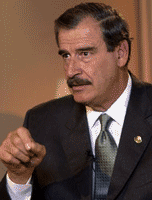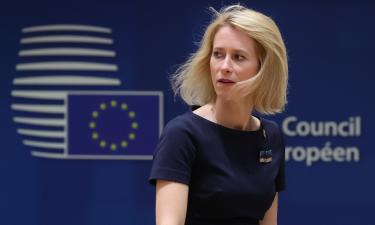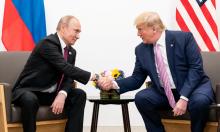Oil and nuclear energy are good reasons for making a good friendship
 Russian-Mexican political relations are merely cloudless, Mexican President Vicente Fox believes
Russian-Mexican political relations are merely cloudless, Mexican President Vicente Fox believes
Mexican President Vicente Fox arrived in Moscow with a two-day visit. “The man, who means business,” as Mr. Fox describes himself, plans to have a meeting with Russian President Putin to sign an international contract about legal assistance, to express his support of Russia's membership in the WTO and sign the memorandum of reciprocal understanding between Russian gas giant Gazprom and the Mexican oil and gas corporation Pemex.
Russia and Mexico are reputed to be oil powers in the world. The two states do not conceal their intention in the formation of politics on the oil market to support stability of the world market of black gold. In addition, Russian and Mexican foreign ministers maintain regular contacts, conducting political consultations on a yearly basis.
Vicente Fox arrives in Moscow on his way from Kiev. The Mexican leader had a meeting with Ukrainian President Viktor Yushchenko and Prime Minister Yulia Timoshenko on Monday morning. Mr. Fox arrived in Ukraine with a group of influential Mexican businessmen. Ukraine established diplomatic relations with Ukraine in January of 1992. The governments of Ukraine and Mexico signed an agreement on trade and economic cooperation only in January of 2003.
The history of Russian-Mexican relations is much longer. The commodity circulation between the two countries increased considerably over the recent five years of Mr. Fox's presidency. It is currently evaluated at some $250 million according to Russian calculations and at about $450 million according to the Mexican president.
It is noteworthy that the opposition to the Mexican leader, who came to big politics from the office of Coca-Cola's president, has been gathering steam lately. The Mexican opposition accuses Mr. Fox of his Spanish origin, the growing level of national unemployment and of weak economic policy.
The Russian-Mexican cooperation is especially beneficial in the energy industry. Mexico totally supports the intention of the Russian administration to join the WTO. The Mexican president said in an interview with the Komsomolskaya Pravda newspaper that his relations with Vladimir Putin were based on trust and mutual understanding. Mr. Fox is certain that the Russian president is a man of business too, which means that Putin makes decisions and controls their execution.
In addition to traditional cooperation in the oil and gas sector, Mexican businessmen are interested in Russian biotechnologies, aviation, communication and nano-technologies. A bilateral contract on the cooperation in the field of peaceful nuclear technologies is planned to be prepared in the near future too.
Russia has become more active on the markets of Latin American states recently, which is considered to be the traditional market of the USA. Developing stable political and economic ties with Mexico is especially important for Russia. Mexico is a member of the joint economic market within the framework of NAFTA (The North American Free Trade Agreement). In addition, Mexico condemned the US-led campaign in Iraq. The political relations between Russia and Mexico are “merely cloudless,” as Vicente Fox put it.
The intergovernmental agreement about legal assistance between Russia and Mexico will become one of the key documents to be signed during Vicente Fox's visit to Moscow. Mexico has a very extensive experience in the field of anti-drug struggle: this problem has been gaining more relevance in Russia during the recent years. In addition, Russian law-enforcement authorities are interested in Mexico's ideas in the struggle against corruption. It is noteworthy, though, that Vicente Fox's suggestions to persecute state officials exposed in their ties with organized crime have not been realized in Mexico yet.
Several bygone criminal stories, which took place in both Russia and Mexico, have recently surfaced on the threshold of Vicente Fox's visit to Moscow. A blood stained ice-axe, with which Lev Trotsky was killed, was found in Mexico. Trotsky used to be considered Joseph Stalin's major competitor in the struggle for power after Vladimir Lenin's death. A well-known Mexican collector, Freddy Novelo, expressed his willingness to hand over several items of his collection to Russia for the DNA analysis. The Mexican collector owns a dress and two documents, which belonged to the family of the last Russian emperor, executed in 1918. Russian scientists believe that blood stains on the dress and the documents may shed light on the last days of the royal family's life.
Subscribe to Pravda.Ru Telegram channel, Facebook, RSS!




